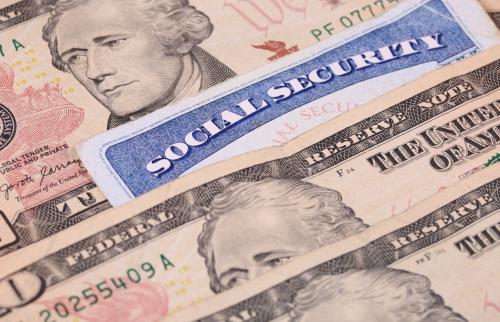George W. Bush is advocating radical change in Social Security, which he himself calls “the single most successful government program in American history.” He would take a part of the payroll tax that now flows to the Social Security trust fund and divert it to personal savings accounts.
But doing so would seriously undermine the finances of the present Social Security system. It would subject Americans, especially financially unsophisticated ones, to large additional risks. And it would abandon the noble commitment to social insurance that this country made in 1935.
While Social Security is a great success, its current large surplus masks a serious long-term financing problem.
Simply put, we have promised far more in future benefits than future payroll tax receipts are likely to finance—about 14 percent more on average over the next 75 years, according to the Social Security trustees’ estimates. This is a huge hole that must be filled by some combination of raising payroll taxes, cutting benefits and infusing general revenue into the trust fund.
With the system in need of more revenue, not less, diverting part of the payroll tax into private accounts, as Mr. Bush proposes, appears irresponsible, unless, of course, you make up the difference by cutting benefits. Without such cuts, privatization would dig the financing hole even deeper, which is why thoughtful privatization proposals generally include significant tax increases to make good on promises that have already been made. But Mr. Bush has not proposed any. This is no minor omission. Diverting 2 percentage points of the payroll tax into individual accounts would drain trillions of dollars from Social Security over the next quarter-century.
And that’s just the beginning.
The Bush plan not only would imperil Social Security’s finances, but would add new elements of cost and risk to the retirement security of millions of Americans. Privatization is superficially attractive for two main reasons: the higher returns that can presumably be earned, say, in the stock market, and the virtues of individual choice. That’s all well and good for financially sophisticated Americans, who happen (by no coincidence) also to enjoy every other advantage in our society, and who, by the way, do not rely heavily on Social Security for their retirement income. But what about the less fortunate citizens, the ones who will need to live on their Social Security checks but who may not know the difference between a stock and a bond?
Is freedom of choice such a blessing for them? Will they understand the risks to which they may be exposed? When funds are invested in stocks and held to retirement, the accumulated balance at retirement is as volatile as the stock market, which not so infrequently moves up or down by 50 percent or more within a few years.
It is a cruel illusion to pretend that small individual accounts will enjoy the full returns that people see in the stock market. There are commissions and, even more important, management fees that can easily exceed 1 percent of assets per year. Then, when they retire, people will discover that buying an individual (as opposed to a group) annuity eats up another chunk of the money, whereas Social Security offers annuities automatically and at zero cost. Furthermore, Social Security’s annuities are protected from inflation, whereas private ones are not.
Finally, let’s remember the central idea behind the Social Security system: to provide social insurance. Both words matter. High-wage earners like me would undoubtedly be better off under the Bush proposal, and even better off under full privatization. After all, universal social insurance forces us to remain in the same pool with, and partially subsidize, those who are less fortunate. Social Security’s benefit formula offers a better rate of return to lower-wage individuals.
From a self-interested point of view, that’s a bad deal for us high-income people. Were Vanguard or Fidelity to offer me a mutual fund like that, I wouldn’t buy any. But people like me cannot opt out of Social Security, and frankly, I don’t want to. Universal social insurance is one of those precious ties that bind our society together. Privatization, whether partial or total, would weaken that tie.
The Brookings Institution is committed to quality, independence, and impact.
We are supported by a diverse array of funders. In line with our values and policies, each Brookings publication represents the sole views of its author(s).



Commentary
Op-edBush Unties the Social Compact
May 26, 2000